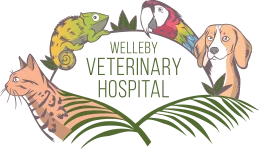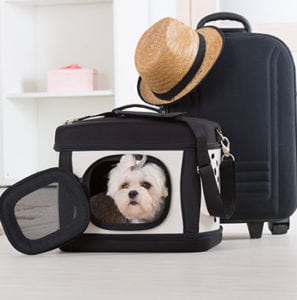Traveling with Your Pet: Pet Health Certificates in Sunrise, FL
Domestic Pet Health Certificates
When planning to travel with your pet within the United States, there may be animal health requirements specific for that destination and/or airline. Factors to consider may include species, meeting time frames for obtaining pet health certificates, updating vaccinations, imaging & diagnostic testing, or administration of medications/ treatments.
Please visit the USDA website for additional information for each state and email your health certificate requests to healthcertificates@welleybvet.com.
International Pet Health Certificates
If you are a planning an international vacation with your pet, there are many things to do in advance to ensure that all goes well. Below is a list of things you will need to get in order prior to your departure.
Every country has different laws and requirements regarding the import of pets. All countries require international pet health certificates. Additionally, some countries require import permits, and blood tests such as titers to ascertain the effectiveness of your pet’s vaccines. Some require specific microchips, while others have mandatory quarantines for animals entering the country. Since every country is unique in their requirements, it is imperative that you do your research well in advance of your trip. A rabies titer, for instance, may take as long as three months to show a level of immunity that meets a country’s specifications. Please understand that rules and regulations change constantly and every country is different.
Please visit the USDA website for additional information for each country.
Since regulations change frequently, it is wise contact the consulate of the country of your destination to confirm that you have all of the forms and information you will need.
Just like countries, every airline has their own set rules, limitations and regulations. Most airlines have very specific requirements regarding the size, dimensions and materials of approved pet carriers. While some airlines advertise a pet friendly passenger cabin, they may only allow one pet in the passenger section per flight. Contacting the airlines in advance can help ensure that your pet rides in the cabin. Some airlines have specific requirements regarding how many days prior to flight the health certificate can be written.
When you make a veterinary appointment for your pet, please advise the receptionist that you are requesting an international health certificate and which country you are traveling to. To travel internationally, pets need an APHIS 7001 form, otherwise known as an International Health Certificate. The veterinarian is required to undergo additional training to be an accredited USDA veterinarian in order to complete this form, so when making an appointment confirm their status. Dr. Zimandy at Welleby Veterinary Hospital is USDA accredited and able to provide these certificates.
When you come to the appointment for your pet, bring:
- All of the necessary forms you obtained from the country’s consulate.
- Your (or the owner of the pet’s) current local address and phone number.
- The exact address of where you (or the person traveling with the pet) will be staying once you reach your destination and phone number.
- Any previous veterinary records for your pet including vaccinations, titer tests. Without this documentation your pet must be revaccinated or a veterinarian cannot issue a health certificate.
During your veterinary visit:
- A physical exam will be performed on your pet.
- If external parasites (fleas, ticks, ear mites) are found on your pet, a flea/tick/ear mite medication will be administered to the pet during the visit. If it is suspected there are other external parasite infections such as scabies or demodex mites, additional testing will be required. If these tests are positive, it will render the pet unfit for travel.
- A fecal test for intestinal parasites must be performed, even if your pet has had this test recently. Please understand that the USDA requires this test and it is illegal for veterinarians to skip them for any reason. Veterinarians cannot issue health certificates to animals that are unwell or test positive for intestinal parasites.
- Required vaccinations will be administered.
- It is recommended to check that your pet’s microchip is functioning properly or have one implanted. Remember to check with your destination country regarding any specific requirements regarding the type of microchip. Also, it is vital that you make sure your pet’s microchip information is up to date. We strongly recommend purchasing ID tags or an embroidered collar with your current contact information in the event you get separated from your pet while traveling.
- The veterinarian will provide the APHIS 7001 form if your pet appears healthy/parasite negative and meets all the country’s requirements for entry. The person who will be traveling with the pet will be listed on the Health Certificate. When the form is completed, the veterinarian will sign it and keep a copy for the pet’s records and you will receive the original.
In some cases, more than one veterinary office visit is required due to some countries
requirements for specific time frames between or before vaccinations, microchips and the health certificate. Please be aware that the veterinarian will not be able to sign the health certificate if all requirements are not met within the proper time frame set forth by the USDA and the importing country. This is why it is recommended to have all of the information BEFORE booking flights and travel!
Now that you have your completed APHIS 7001 form (International Health Certificate) you must bring your form and supporting documents to the USDA office to be endorsed by a State USDA veterinarian. You MUST have an appointment to get this endorsement. DO NOT bring your pet to this appointment.
Miami office:
Phone: (305) 876-2200
6300 NW 36th Street, Miami, FL 33122
Gainesville office:
Phone: (352) 313-3062
8100 NW 15th Place, Gainesville, FL 32606
You may check the USDA website for any changes to the office information.
Some countries require additional forms to be filled out at their consulate office. While at the
USDA office, this is a good time to make sure you have all the additional documentation you may need.
Depending on the country and the length of your stay, you may need to jump through a similar set of hoops to come home.
Helpful Websites:
Travel with your pet state to state (Interstate)
Take your pet from the United States to a foreign country (Export)
Bring your pet into the United States from a foreign country (Import)
Peace of Mind Pet Shipping / Bobbi’s World Kennels (Local- Fort Lauderdale)

